- Home
- Bill Bryson
The Road to Little Dribbling Page 2
The Road to Little Dribbling Read online
Page 2
Like many British towns, Eastleigh has closed its factories and workshops, and instead is directing all its economic energies into the making and drinking of coffee. There were essentially two types of shop in the town: empty shops and coffee shops. Some of the empty shops, according to signs in their windows, were in the process of being converted into coffee shops, and many of the coffee shops, judging by their level of custom, looked as if they weren’t far off becoming empty shops again. I am no economist, but I am guessing that that’s what is known as a virtuous circle. One or two more adventurous entrepreneurs had opened pound stores or betting shops, and a few charities had taken over other abandoned premises, but on the whole Eastleigh seemed to be a place where you could either have a cup of coffee or sit and watch pigeons defecate. I had a cup of coffee, for the sake of the economy, watched a pigeon defecate across the way, then presented myself at Wessex House for my test.
Five of us were present for testing on this particular morning. We were shown to a roomful of desks, each with a computer screen and a mouse sitting on a plain mat, and seated so that we couldn’t see anyone else’s screen. Once settled, we were given a practice test of four questions to make sure we were comfortably in command of our mouse and mousepad. Because it was a practice test, the questions were encouragingly easy, along the lines of:
Manchester United is:
(a) a political party
(b) a dance band
(c) an English football team
It took about fifteen seconds for four of us to answer the practice questions, but one lady – pleasant, middle-aged, slightly plumpish, I am guessing from one of those Middle Eastern countries where they eat a lot of sticky sweets – took considerably longer. Twice the supervisor came to see if she was all right. I passed the time discreetly looking in my desk drawers – they were unlocked but empty – and seeing if there was any way to have fun moving a cursor around a blank screen. There isn’t.
At length the woman announced that she had finished and the supervisor came to check her work. He bent to her screen and in a tone of quiet amazement said: ‘You’ve missed them all.’
She beamed uncertainly, not sure if this was an achievement.
‘Do you want to try them again?’ the supervisor asked helpfully. ‘You’re entitled to try again.’
The woman gave every appearance of having no clear idea of what was going on, but gamely elected to press on, and so the test began.
The first question was: ‘You’ve seen Eastleigh. Are you sure you want to stay in Britain?’ Actually, I don’t recall what the first question was or any of those that followed. We weren’t allowed to bring anything to the desk, so I couldn’t take notes or tap my teeth thoughtfully with a pencil. The test consisted of twenty-four multiple-choice questions and took only about three minutes. You either know the answers or you don’t. I presented myself at the supervisor’s desk upon completion, and we waited together while the computer checked my answers, a process that took about as long as the test itself, and at last he told me with a smile that I had passed, but he couldn’t tell me exactly how I did. The computer only indicated pass or fail.
‘I’ll just print out your result,’ he said. This took another small age. I was hoping for a smart parchment-like certificate, like you get when you climb Sydney Harbour Bridge or do a cookery course with Waitrose, but it was just a faintly printed letter confirming that I was certified as intellectually fit for life in modern Britain.
Beaming like the lady from the Middle East (who appeared to be hunting around for a keyboard when last I glimpsed her), I left the building feeling pleased, even a little exhilarated. The sun was shining. Across the way at the bus station, two men in bomber jackets were having a morning aperitif from matching cans of lager. A pigeon picked at a cigarette butt and squeezed out a little shit. Life in modern Britain, it seemed to me, was pretty good.
IV
A day or so later, I met my publisher, a kindly and much loved fellow named Larry Finlay, for lunch in London, to discuss a subject for my next book. Larry lives in quiet dread that I will suggest some ludicrously uncommercial topic – a biography of Mamie Eisenhower, perhaps, or something on Canada – and so always tries to head me off with an alternative suggestion.
‘Do you know,’ he said, ‘it’s twenty years since you wrote Notes from a Small Island?’
‘Really?’ I replied, amazed at how much past one can accumulate without any effort at all.
‘Ever thought about a sequel?’ His tone was casual, but in his eyes I could see little glinting pound signs where his irises normally were.
I considered for a moment. ‘Actually there is a certain timeliness to that,’ I said. ‘I’m just about to take out British citizenship, you know.’
‘Really?’ Larry said. The pound signs brightened and began to pulsate ever so slightly. ‘You’re giving up your American citizenship?’
‘No, I keep it. I’ll have British and American both.’
Larry was suddenly racing ahead. Marketing plans were forming in his head. Underground posters – not the really big ones, the much smaller kind – were springing to mind. ‘You can take stock of your new country,’ he said.
‘I don’t want to end up going back to all the same places and writing about all the same things.’
‘Then go to different places,’ Larry agreed. ‘Go to’ – he searched for a name to nominate, somewhere no one’s ever been – ‘Bognor Regis.’
I looked at him with interest. ‘That’s the second reference I have heard to Bognor Regis this week,’ I said.
‘Think of it as a sign,’ Larry said.
Later that afternoon, at home, I pulled out my ancient and falling-apart AA Complete Atlas of Britain (so old that it shows the M25 as a dotted aspiration) just to have a look. Apart from anything else I was curious to see what is the longest distance you can travel in Britain in a straight line. It is most assuredly not from Land’s End to John o’Groats, despite what my official study guide had said. (What it said, for the record, is: ‘The longest distance on the mainland is from John o’Groats on the north coast of Scotland to Land’s End in the south-west corner of England. It is about 870 miles.’) For one thing, the northernmost outcrop of mainland is not John o’Groats but Dunnet Head, eight miles to the west, and at least six other nubbins of land along that same stretch of coastline are more northerly than John o’Groats. But the real issue is that a journey from Land’s End to John o’Groats would require a series of zigzags. If you allow zigzags, then you could carom about the country in any pattern you wished and thus make the distance effectively infinite. I wanted to know what was the furthest you could travel in a straight line without crossing salt water. Laying a ruler across the page, I discovered to my surprise that the ruler tilted away from Land’s End and John o’Groats, like a deflected compass needle. The longest straight line actually started at the top left-hand side of the map at a lonely Scottish promontory called Cape Wrath. The bottom, even more interestingly, went straight through Bognor Regis.
Larry was right. It was a sign.
For the briefest of periods, I considered the possibility of travelling through Britain along my newly discovered line (the Bryson Line, as I would like it now to become generally known, since I was the one who discovered it), but I could see almost at once that that wouldn’t be practical or even desirable. It would mean, if I took it literally, going through people’s houses and gardens, tramping across trackless fields, and fording rivers, which was clearly crazy; and if I just tried to stay close to it, it would mean endlessly picking my way through suburban streets in places like Macclesfield and Wolverhampton, which didn’t sound terribly rewarding either. But I could certainly use the Bryson Line as a kind of beacon, to guide my way. I determined that I would begin and end at its terminal points, and visit it from time to time en route when I conveniently could and when I remembered to do so, but I wouldn’t force myself to follow it religiously. It would be, rather, my terminus ad quem, wh
atever exactly that means. Along the way, I would, as far as possible, avoid the places I went to on the first trip (too much danger of standing on a corner and harrumphing at how things had deteriorated since I was last there) and instead focus on places I had never been, in the hope I could see them with fresh, unbiased eyes.
I particularly liked the idea of Cape Wrath. I know nothing about it – it could be a caravan park, for all I know – but it sounded rugged and wave-battered and difficult to get to, a destination for a serious traveller. When people asked me where I was bound, I could gaze towards the northern horizon with a set expression and say: ‘Cape Wrath, God willing.’ I imagined my listeners giving a low whistle of admiration and replying, ‘Gosh, that’s a long way.’ I would nod in grim acknowledgement. ‘Not even sure if there’s a tearoom,’ I would add.
But before that distant adventure, I had hundreds of miles of historic towns and lovely countryside to get through, and a visit to the celebrated English seaside at Bognor.
Chapter 1
Bugger Bognor!
BEFORE I WENT THERE for the first time, about all I knew about Bognor Regis, beyond how to spell it, was that some British monarch, at some uncertain point in the past, in a moment of deathbed acerbity, called out the words ‘Bugger Bognor’ just before expiring, though which monarch it was and why his parting wish on earth was to see a medium-sized English coastal resort sodomized are questions I could not answer.
The monarch, I have since learned, was King George V, and the story is that in 1929 he travelled to Bognor on the advice of his physician, Lord Dawson of Penn, who proposed that a spell of fresh sea air might help him recover from a serious lung complaint. That Dawson could think of no better treatment than a change of scene is perhaps a reflection of his most outstanding characteristic as a doctor: incompetence. Dawson was in fact so celebrated for medical ineptitude that a ditty was composed in his honour. It went:
Lord Dawson of Penn
Has killed lots of men.
So that’s why we sing
God save the King.
The king chose Bognor not because he held any special affection for it, but because a rich chum of his named Sir Arthur du Cros had a mansion there called Craigweil House, which he offered to the king for his private use. Craigweil was by all accounts an ugly and uncomfortable retreat, and the king liked nothing about it, but the sea air did do him good and after a few months he was well enough to return to London. If he left with any fond memories of Bognor, he didn’t relate them.
Six years later, when the king relapsed and now lay dying, Dawson blandly assured him that soon he would be well enough to return to Bognor for another holiday. ‘Bugger Bognor,’ the king reportedly said and thereupon died. The story is nearly always dismissed as fiction, but one of George V’s biographers, Kenneth Rose, maintains that it could be true and that it certainly would not have been out of character.
Because of the king’s short residency, Bognor petitioned to have the word Regis added to its title, and in 1929 this was granted, so that interestingly its supreme elevation and onset of terminal decline date from almost precisely the same moment.
Like so much of coastal Britain, Bognor has seen better days. Once upon a time happy, well-dressed throngs flocked to the town for carefree weekends. Bognor had a Theatre Royal, a grand Pavilion with what was said to be the finest dance floor in the south of England, and a much esteemed if not very accurately named Kursaal, where no one was cured of anything but patrons could roller-skate to the music of a resident orchestra and afterwards dine beneath giant palms. All that is distant history now.
The pier at Bognor survives, but barely. Once it was a thousand feet long, but various owners took to lopping lengths off it following fires or storm damage so that today it is just a stub three hundred feet long that doesn’t quite reach the sea. For years Bognor had an annual birdman competition, in which competitors tried to get airborne from the pier end using various homemade contraptions – bicycles with rockets strapped to the sides and that sort of thing. Invariably the competitors would travel an amusingly short distance and splash into the water, to the delight of the watching crowds, but eventually the shortened pier meant that they were crash-landing on sand and shingle in a way that was more alarming than amusing. The competition was cancelled in 2014 and appears now to have moved permanently a few miles down the coast to Worthing, where the prizes are bigger and the pier actually stands over water.
In an effort to reverse Bognor’s long, gentle decline, in 2005 Arun District Council formed the Bognor Regis Regeneration Task Force with the goal of bringing £500 million of investment to the town. As it became clear that nothing on that scale would ever be forthcoming, the target was quietly reduced first to £100 million and then to £25 million. These also proved too ambitious. Eventually it was decided that a more realistic target was a sum of about zero. When it was realized that that goal had already been reached, the task force was wound up, its work completed. Now, as far as I could tell, all the authorities are doing for Bognor is just keeping it ticking over, like a patient on life support.
But for all that Bognor isn’t such a bad place. It has a long beach with a curving concrete promenade, and a town centre that is compact and tidy, if not thriving. Just inland from the sea is a sylvan retreat called Hotham Park, with winding paths, a small boating pond and a toy railway. But that, it must be said, is about it. If you do a web search for things to do in Bognor, Hotham Park is the first thing that comes up. The second suggested attraction is a shop selling mobility scooters.
I walked down to the seafront. A good number of people were ambling along, enjoying the sunshine. We were about to have a lovely summer and even now at ten thirty in the morning you could see that this day was going to be, by English standards, a scorcher. My original plan was to stroll west along the front to Craigweil, to see where the king had stayed, but that hope was dashed when I learned that Craigweil was torn down in 1939 and that today the site is lost somewhere beneath a housing estate. So instead I walked east along the promenade towards Felpham because that was the direction that nearly all the other strollers were going in and I assumed they knew what they were doing.
On one side stood the beach and a bright, glittering sea, and on the other was a line of smart modern homes, all with high walls to preserve their privacy from us on the promenade. The owners, however, had not solved the obvious problem that a wall designed to keep passers-by from peering in also keeps those on the inside from seeing out. If the occupants of these smart houses wanted to look at the sea, they had to go upstairs and sit on a balcony, but that meant exposing themselves to our gaze. We could see everything about them – whether they were tanned or pale, having a cold drink or a hot one, were tabloid readers or Telegraph readers. The people on the balconies pretended not to be bothered about this, but you could tell they were. It was a lot to ask after all. They had to pretend first of all that their balconies somehow made them invisible to us and then additionally they had to pretend that we were in any case such an incidental part of the panorama that they had never actually noticed us down there looking up at them. That was a lot of pretending to have to do.
As a test, I tried to make eye contact with the people on the balconies. I smiled as if to say, ‘Hello there, I see you!’ but they always looked quickly away or affected not to see me at all, but rather were absorbed by something far off on the horizon, in the general vicinity of Dieppe or possibly Deauville. Sometimes I think it must be a little exhausting to be English. At all events, it seemed obvious to me that we on the promenade had much the better deal since we could see the sea at all times without having to go to a higher elevation and we never had to pretend that no one could see us. Best of all, at the end of the day we could get in our cars and drive home to somewhere that wasn’t Bognor Regis.
My plan, after Bognor, was to take a bus along the coast to Brighton, and I was quietly excited about this. I had never experienced this stretch of coastline and had great
hopes for it. I had printed out a timetable and carefully selected the 12.19 as the best bus for my purposes, but as I ambled to the bus stop now, thinking I had minutes to spare, I watched in mild dismay as my bus departed just ahead of a cloud of black smoke. It took me a minute to work out that my watch was not right, that the battery was evidently dying. With a half-hour to kill till the next bus, I went into a jeweller’s shop, where a cheerless man looked at the watch and told me that a replacement battery would be £30.
‘But I barely paid that for the watch,’ I sputtered.
‘That may explain why it’s not working,’ he said and handed it back with a look of majestic indifference.
I waited to see if he had anything more to say, if there existed within him the faintest flicker of interest in helping me to get the right time on my wrist and possibly in the process keep his business going. It appeared not.
‘Well, I’ll leave it for now,’ I said. ‘I can see you are very busy.’
If he had any appreciation for my instinct for mirth, he failed to show it. He gave a shrug and that was the end of our relationship.
I was hungry, but now had only twenty minutes before the next bus, so I went into a McDonald’s for the sake of haste. I should have known better. I have a little personal history with McDonald’s, you see. Once a few years ago after a big family day out we stopped at a McDonald’s in response to cries from a back-seatful of grandchildren pleading for an unhealthy meal, and I was put in charge of placing the order. I carefully interviewed everyone in the party – about ten of us, from two cars – collated the order on to the back of an old envelope and approached the counter.
‘OK,’ I said decisively to the youthful attendant when my turn came, ‘I would like five Big Macs, four quarter-pound cheeseburgers, two chocolate milkshakes—’

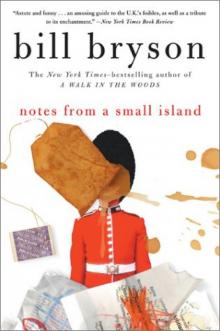 Notes from a Small Island
Notes from a Small Island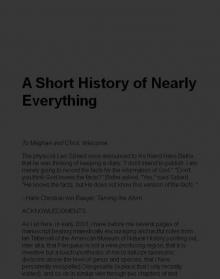 A Short History of Nearly Everything
A Short History of Nearly Everything A Walk in the Woods
A Walk in the Woods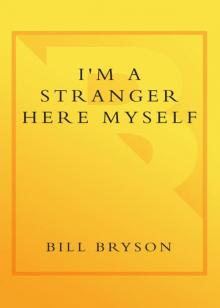 I'm a Stranger Here Myself
I'm a Stranger Here Myself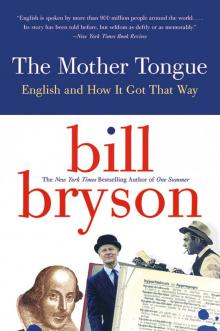 The Mother Tongue
The Mother Tongue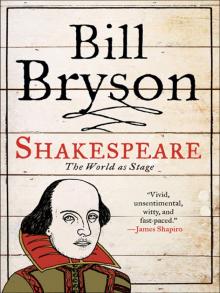 Shakespeare
Shakespeare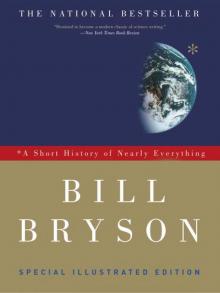 A Short History of Nearly Everything: Special Illustrated Edition
A Short History of Nearly Everything: Special Illustrated Edition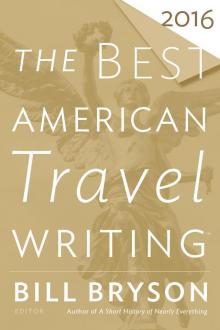 The Best American Travel Writing 2016
The Best American Travel Writing 2016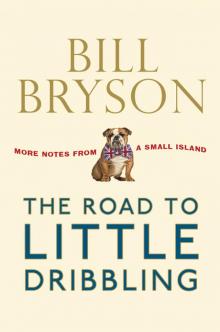 The Road to Little Dribbling
The Road to Little Dribbling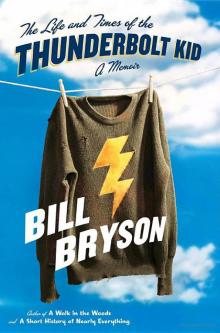 The Life And Times Of The Thunderbolt Kid: A Memoir (v5.0)
The Life And Times Of The Thunderbolt Kid: A Memoir (v5.0) Made In America
Made In America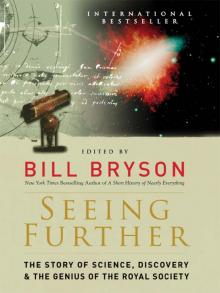 Seeing Further
Seeing Further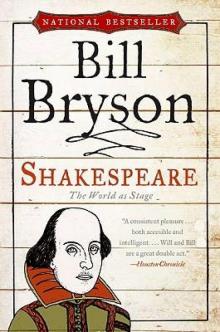 Shakespeare: The World as Stage
Shakespeare: The World as Stage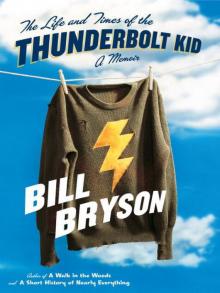 The Life and Times of the Thunderbolt Kid
The Life and Times of the Thunderbolt Kid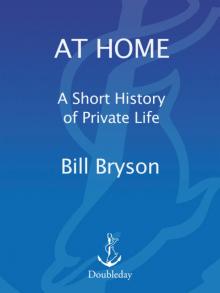 At Home
At Home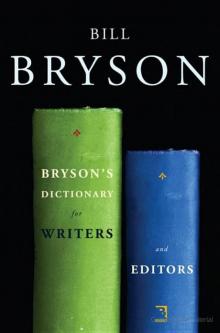 Bryson's Dictionary For Writers And Editors (v5.0)
Bryson's Dictionary For Writers And Editors (v5.0) Neither Here Nor There
Neither Here Nor There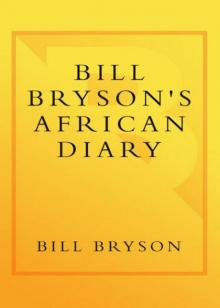 Bill Bryson's African Diary
Bill Bryson's African Diary